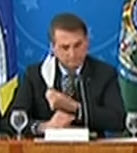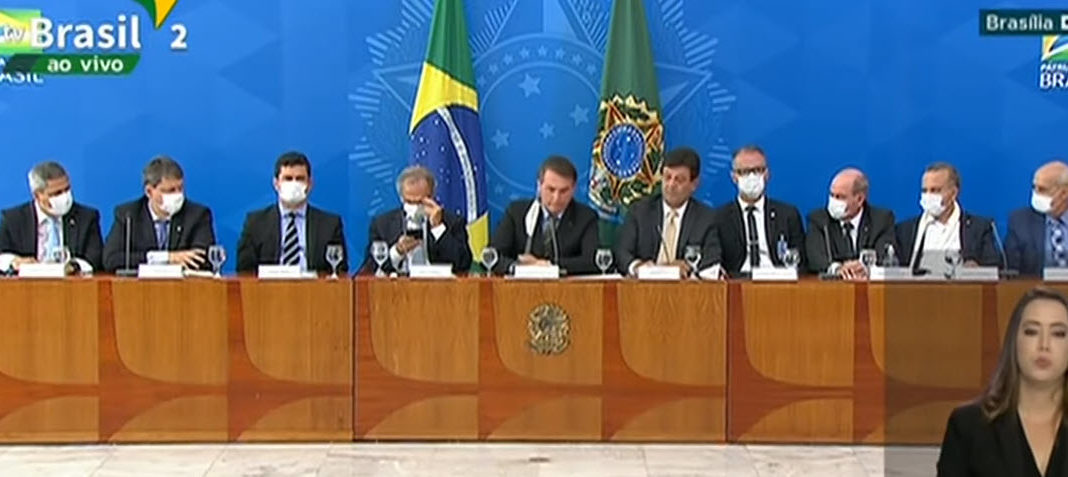Brazil faces two disasters: the pandemic of coronavirus, and the pandemonium of the Bolsonaro government. The first is invisible and highly contagious but should only last a few months. The second is highly visible but has three and three quarter years to run.
‘Bolsonaro has tested negative for president. The counterproof was the “panelaço”, the protest of the middle classes, many of whom voted for him,’ wrote one commentator. In Italy and Spain the windows and balconies echoed to song and music. But in Brazil they echoed to the sound of saucepan banging and shouts of Fora Bolsonaro (Bolsonaro Out).
For many the last straw was the bizarre press conference where the president appeared with eight of his ministers, sitting tightly packed elbow to elbow, but wearing white masks. The effect was grotesque.

While the Health Minister attempted to convey the seriousness of the situation, Bolsonaro distracted attention by playing with his mask, finally ripping it off in irritation and leaving it dangling from one ear. Instead of seizing the moment to show leadership, calming fears and inspiring confidence, he attacked the press for alarmism, and declared that Brazil is easily winning the fight against the virus with a ‘goleada’ (a string of goals). ‘To be fair, the credit belongs to the coach, that is Jair Bolsonaro,’ bragged the president. Later he derided the virus as a ‘just a little flu’.
The conservative press, which supported Bolsonaro’s election mainly to prevent a PT victory, has now given up trying to defend the indefensible, and in strongly worded editorials is calling for him to go. Impeachment is openly talked about, but House of Deputies speaker Rodrigo Maia and leaders of political parties of all persuasions caution that in the middle of an epidemic is not the time. ‘We can’t divert energy from voting projects which protect people. There are 40 million informal workers who won’t have anything to eat,’ said PT leader Enio Verri.
Some suggest that Bolsonaro should be declared unfit, or even insane, or that widespread civil disobedience could effectively sideline him. Extreme measures for extreme times. Marcos Nobre, director of Cebrap, wrote that Bolsonaro is not just incompetent or unfit but a parasite who should be politically quarantined, while an alternative government led by congress runs the country. Supreme Court justice Gilmar Mendes has sent a constitutional amendment to congress which would introduce semi-parliamentary rule.
For sociologist Celso Rocha de Barros, ‘Bolsonarism is clearly in decline. The panelaços, the stampede (debandanda) of rightwingers shocked by the presidential dementia, the rebellion of the governors, the despair of the agribusiness sector because of the attacks (by Eduardo Bolsonaro) on China, all this suggests that Bolsonaro would fall if people could take to the streets.’
But Bolsonaro shows no signs that he recognises his own incompetence or waning popularity. He is even said to be thinking of declaring a state of siege to give himself more power, removing it from the state governors who are taking anti-virus measures independently of the federal government. So credible is this scenario that the Brazilian Bar Association (OAB) even issued a statement declaring such a move unconstitutional.
The governors of São Paulo and Rio, who paraded their support of Jair Bolsonaro to get elected in 2018, have now turned on him. Accusing them of playing politics with an eye to the presidential elections of 2022, Bolsonaro has lost no chance to insult them, even calling São Paulo governor João Doria a ‘lunatic’ when he ordered a two-week closure of shops, schools and parks and services.
The China Syndrome
While Bolsonaro is in denial and the number of those infected grows, his son, federal congressman Eduardo Bolsonaro decided to pick a fight with China, echoing Big Brother in Washington, who insists on calling it the Chinese virus. He accused the Chinese Communist Party of hiding the outbreak, as the Soviet Union hid the nuclear disaster in Chernobyl. ‘The fault is China’s and the solution is freedom.’
These declarations led to a furious response from the Chinese ambassador Yang Wanming. The agribusiness lobby, for whom China is the main market, hurried to make amends, noting that it was an isolated declaration that did not represent national feeling. ‘Such imprudence, besides being an attack on our diplomatic relations, has also led to the Chinese ambassador becoming the target of threats to his personal safety.’
Brazil’s foreign minister, Ernesto Araujo, however, instead of supporting this diplomatic statement, launched another attack on the ambassador, demanding that he, not Bolsonaro, apologize.
This led to an unprecedented editorial from the previously pro-Bolsonaro Bandeirantes group, calling Araujo an idiot. The group has connections with the agribusiness sector. And vice president, Hamilton Mourão, who went personally to China to explain away Bolsonaro’s anti-China remarks before he took office, criticised the president’s son and said that if his name was Bananinha (little banana) instead of Bolsonaro, there would have been no repercussions, thus giving him a nickname that will probably stick.
The economy in reverse
While the Bolsonaro family busied itself with creating problems, economists warned that the measures taken by the economic team were not only inadequate but went in the opposite direction to those adopted in other countries, penalising instead of helping workers. Proposals include reducing the wages and hours of regular employees by 50 per cent to help firms. ‘Instead of guaranteeing their rights, the government wants to make them more precarious’, said a trade unionist.
Even worse was the executive order which Bolsonaro signed on Sunday, allowing firms to lay off employees for 4 months unpaid leave. They would not count as unemployed, thus not swelling the official numbers of jobless. But such was the reaction to this drastic measure, that the president revoked his own order hours later.
Instead of targeting wages and jobs, economist Mônica de Bolle suggested that the government should invest up to 4 per cent of GDP in the health system and above all in persons, increasing the Bolsa Familia and introducing a minimum income for millions of Brazilians now without work, to avoid them being reduced to misery.
Public health doctors criticised the government’s decision to pass R$10 bilhões (US$2 billion) to private health plans instead of to the SUS, Brazil’s equivalent of the NHS, which is in the forefront of the battle against the coronavirus.
The big concern of the doctors is what happens when the virus reaches the millions living in cramped overcrowded conditions in Brazil’s many favelas and squatter towns. How can they practise social distancing, how can they even wash their hands when often the taps are dry? So far, all the government’s advice and propaganda has been directed at middle class Brazilians, living in flats and houses with utilities. There has been no attempt to reach out to the communities. Favela associations have had to begin their own campaigns, making posters and composing rap music to get the messages of how to avoid the virus across.
The Bolsonaro government, notorious for its lack of empathy or solidarity with poorer Brazilians, is allowing the same prejudice to determine its fight against the coronovirus, but as the number of victims rises and social conditions deteriorate, the seeds of revolt are being sown.

